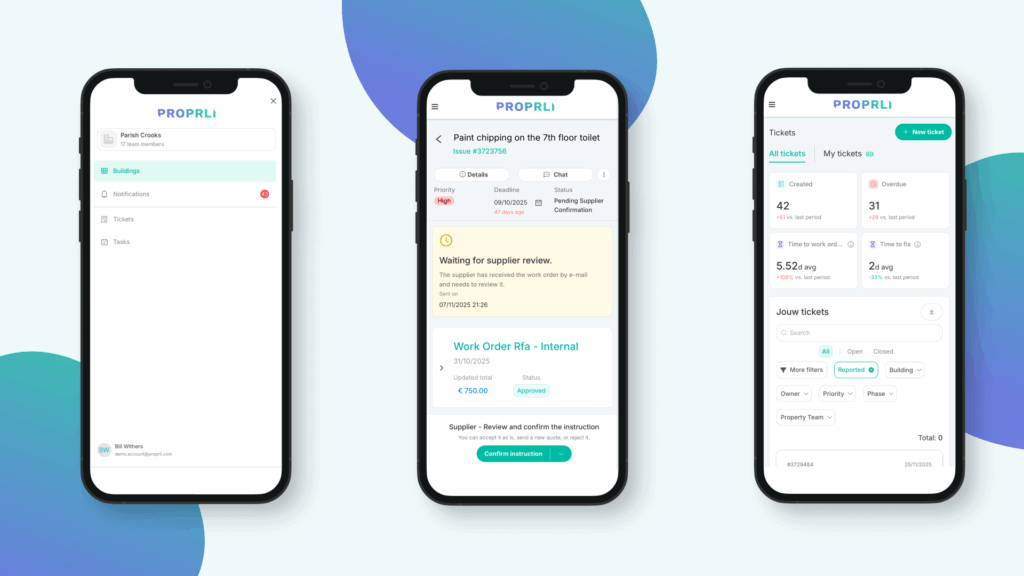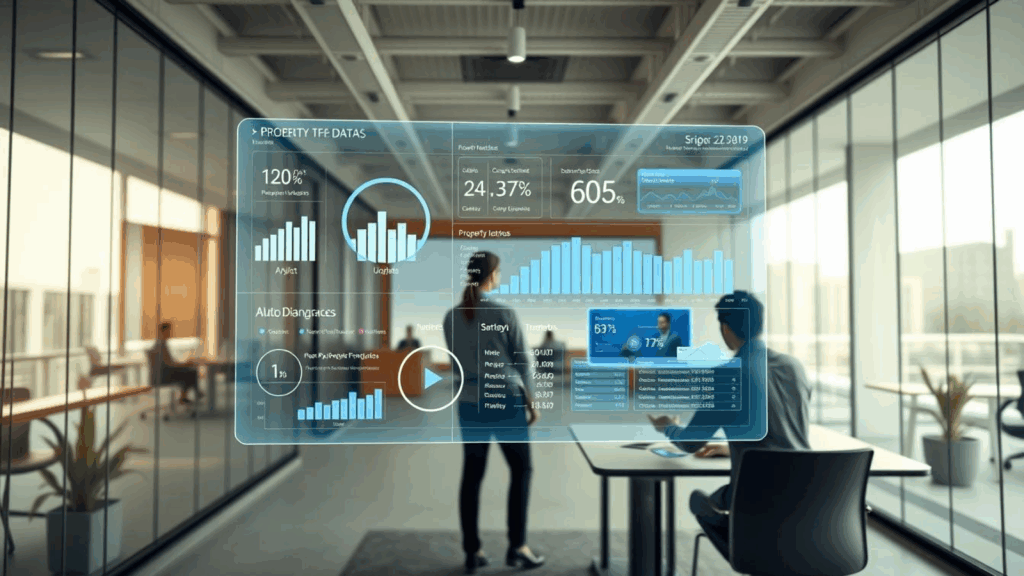The real estate sector is witnessing a profound transformation, with property management innovation leading the charge. Looking ahead to 2025, several groundbreaking trends are redefining real estate management. These include smart home technology, proptech solutions, automated maintenance systems, and data-driven asset management. These innovations are transforming property management and operation.
The integration of digital property platforms and IoT in property operations is making processes more efficient. It’s also enhancing tenant experiences. Additionally, the emphasis on sustainability in real estate is promoting eco-friendly practices and energy-efficient solutions. AI is now being used to make data-driven decisions, optimize asset performance, and discover new growth opportunities.
The global real estate market is expanding, with a projected CAGR of 5.00% from 2024 to 2032. This growth is driven by increasing demand for quality housing and infrastructure. In the United States, real estate is a significant contributor to the economy, accounting for about 13% of the country’s annual GDP. This growth, combined with the rapid adoption of modern innovations, promises an exciting future for property management.
Key Takeaways
- Property management innovation is revolutionizing the real estate industry
- Smart home technology and proptech solutions are enhancing efficiency and tenant experiences
- Automated maintenance systems and data-driven asset management are optimizing property operations
- Sustainability in real estate is driving the adoption of eco-friendly practices
- AI-powered property insights enable data-driven decision-making and uncover growth opportunities
The Evolution of Property Management Technology
The real estate industry has seen a major shift, thanks to disruptive technology. AI and IoT are transforming property management. These advancements are part of a broader trend in real estate technology.
Artificial intelligence (AI) has emerged as a game-changer. AI software automates tasks like tenant screening and maintenance scheduling. It uses machine learning to help managers make informed decisions, boosting efficiency.
The Internet of Things (IoT) is another significant trend. IoT connects devices in properties, allowing managers to monitor and control them remotely. This improves comfort and reduces costs.
Virtual and augmented reality (VR/AR) are also impacting the industry. VR enables virtual tours, saving time and resources. AR adds digital layers to physical spaces, enhancing the tenant experience.
Cloud-based solutions are another innovation. They allow managers to access information from anywhere. This improves teamwork and makes operations more flexible.
Big data analytics is also crucial. It helps managers understand their operations through data analysis. This leads to better decision-making and portfolio optimization.
As the industry evolves, adopting these technologies is key. They help streamline operations, improve tenant experiences, and drive success. Embracing these innovations is essential for property managers to thrive.
Artificial Intelligence: The Game-Changer in Property Management
Artificial Intelligence (AI) is transforming the real estate industry, changing how we manage properties. It streamlines operations, improves decision-making, and enhances tenant experiences. AI’s applications in property management are vast, from lease abstraction to predictive analytics.
AI automates repetitive tasks, saving time and effort. Lease abstraction tools quickly analyze documents, while automated valuation models provide accurate property values. These tools aid in investment decisions and portfolio management.
AI chatbots and virtual assistants are gaining traction in property management. They handle inquiries, schedule appointments, and offer 24/7 support. This boosts tenant satisfaction and reduces the workload for property managers. AI-powered search tools also understand natural language, matching tenants with suitable properties.
Predictive AI analytics is a game-changer. It forecasts rental prices, identifies maintenance needs, and optimizes property performance. This data-driven approach helps property managers make informed decisions and anticipate challenges.
| AI Application | Benefits |
|---|---|
| AI Lease Abstraction | Automated summarization of lease documents |
| Automated Property Valuation | Accurate and real-time property value assessments |
| AI Chatbots and Virtual Assistants | 24/7 customer support and task automation |
| AI Property Search | Intelligent matching of tenants with suitable properties |
| Predictive AI Analytics | Data-driven insights for optimizing property performance |
Adopting AI in property management comes with challenges. It requires significant investment in technology and data management. There are also concerns about data privacy and AI ethics. Yet, with responsible deployment, AI can revolutionize property management and drive innovation in real estate.
Internet of Things (IoT) in Property Management
The Internet of Things (IoT) is transforming property management by integrating smart devices and sensors into buildings. This integration enhances efficiency, sustainability, and tenant satisfaction. Smart building sensors collect real-time data on energy use, occupancy, and environmental conditions.
IoT’s key benefit is efficient space utilization. By monitoring occupancy, property managers can optimize space, cutting costs and improving tenant experience. Smart sensors adjust lighting, temperature, and settings based on occupancy, saving energy.
IoT also enables smart home automation, giving tenants control over their spaces. Smart thermostats, lighting, and appliances allow for personalized energy management. This automation boosts tenant satisfaction and supports sustainability goals.
IoT is crucial for sustainability in property management. It helps identify energy and water savings opportunities. Real-time data leads to proactive maintenance and efficient system operation. IoT predictive maintenance prevents failures, saving costs and reducing downtime.
IoT creates smart building ecosystems. It connects sensors, devices, and systems for a comprehensive view of building operations. This connectivity optimizes performance, enhances comfort, and ensures system efficiency.
As IoT adoption in property management expands, staying updated is vital. Embracing IoT solutions opens doors to efficiency, sustainability, and tenant satisfaction. This positions property managers at the forefront of the industry’s digital evolution.
Virtual and Augmented Reality in Real Estate
The real estate sector is embracing advanced technology to change how properties are shown and experienced. Virtual reality (VR) and augmented reality (AR) are transforming property management. They offer immersive experiences that go beyond traditional viewing methods.
VR real estate tours are changing how properties are presented. Real estate companies use specialized cameras and software to create 360-degree virtual tours. These tours let potential buyers explore properties from home. They provide a realistic and interactive way to see properties, examine rooms, and understand the layout.
AR property staging elevates the viewing experience. AR technology lets real estate agents show buyers how a property can be customized. Buyers can virtually furnish and decorate properties, trying out different styles and designs. This interactive approach helps buyers make informed decisions and imagine themselves in the property.
VR and AR offer more than just enhanced viewing experiences. They also benefit property developers and real estate firms. By showcasing unfinished projects virtually, developers can understand buyer preferences. This feedback helps refine designs and ensure the final product meets market needs.
The impact of VR and AR on real estate is significant:
- Immersive property viewing experiences that engage and captivate potential buyers
- Enhanced accessibility, allowing buyers to explore properties remotely and at their convenience
- Personalized property staging through AR, enabling buyers to visualize their dream homes
- Improved decision-making processes, as buyers can make more informed choices based on virtual experiences
- Valuable insights for property developers, facilitating the creation of properties that meet market demands
The use of VR and AR in real estate is set to grow. As more firms adopt these technologies, virtual property showcasing will become the standard. By embracing VR and AR, the real estate industry is enhancing the buyer experience and driving innovation.
Cloud-Based Property Management Solutions
The introduction of cloud-based inventory management has transformed property management operations. It allows managers to access critical data from anywhere, at any time, using any internet-enabled device. This flexibility is essential in today’s fast-paced, global business world.
Cloud-based systems offer real-time updates, a significant advantage. Changes to inventory, maintenance, or tenant details are instantly updated across the system. This ensures all stakeholders have the latest information, reducing errors and miscommunication.
Scalability is another key benefit of cloud-based systems. They can grow with your business, whether managing one property or many. This eliminates the need for expensive hardware upgrades or software installations.
Cloud-based solutions also provide enhanced security. They protect your data from unauthorized access and cyber threats. With advanced encryption, regular backups, and strict access controls, your information is safe and secure.
| Traditional Property Management | Cloud-Based Property Management |
|---|---|
| On-premise software installations | Cloud-based, accessible from anywhere |
| Manual updates and data synchronization | Real-time updates across all devices |
| Limited scalability, requires hardware upgrades | Highly scalable, adapts to business growth |
| In-house security measures | Enhanced security features and regular backups |
Switching to cloud-based property management offers many benefits. These include:
- Improved collaboration among team members
- Streamlined workflows and increased efficiency
- Enhanced tenant experience through self-service portals
- Reduced IT costs and maintenance requirements
As the property management industry evolves, adopting cloud-based solutions is crucial. They enable property managers to achieve greater efficiency, flexibility, and growth. By leveraging centralized data, real-time updates, and scalable systems, managers can unlock new opportunities.
Big Data Analytics for Data-Driven Property Management
In today’s fast-paced property management world, big data analytics is a game-changer. It allows managers to make informed decisions that boost efficiency and tenant satisfaction. Advanced tools are key for streamlining operations, spotting trends, and improving performance.
Customizable dashboards offer a clear view of important metrics like occupancy, rent, maintenance, and energy use. This gives a full picture of the portfolio’s health. Managers can tailor these dashboards to focus on specific areas, quickly spotting and addressing issues.
Trend analysis is vital in property management. It uses historical data and algorithms to forecast trends like market shifts, tenant preferences, and maintenance needs. This foresight helps managers make smart decisions, adjust pricing, and allocate resources wisely.
Automated reporting is a big plus of big data analytics. It lets managers create detailed reports on financials, tenant satisfaction, and maintenance costs easily. These reports are timely, saving effort and offering crucial insights for stakeholders and investors.
| Data-Driven Property Management Benefits | Traditional Property Management |
|---|---|
| Real-time insights and proactive decision-making | Reactive decision-making based on limited data |
| Customizable dashboards for key performance indicators | Static reports with limited customization options |
| Predictive maintenance and resource optimization | Reactive maintenance and inefficient resource allocation |
| Automated reporting and stakeholder communication | Manual reporting and time-consuming stakeholder updates |
The ultimate goal of big data analytics in property management is data-driven decision making. It uses advanced insights to drive efficiency, tenant satisfaction, and profit. From scheduling maintenance to finding new revenue streams, data-driven decisions keep managers competitive.
As the property management field evolves, big data analytics will be more crucial for success. Managers who use these tools will lead in optimizing operations, improving tenant experiences, and driving growth in the dynamic real estate market.
Property Management Innovation: Embracing Sustainability
Looking ahead to 2025, sustainability is key in property management innovation. Property managers are adopting green practices, eco-friendly supplies, and energy-efficient equipment. These steps reduce environmental impact and costs. They also attract eco-conscious tenants and support global climate change efforts.
Green inventory practices are a major trend. This means using biodegradable, recyclable, or sustainable supplies. By tracking inventory and reducing waste, managers meet sustainability goals and lower their ecological footprint. Inventory management software helps in this process, preventing waste.
Investing in energy-efficient equipment is crucial. This includes appliances, lighting, and heating systems. Such choices cut energy use and carbon emissions. Managers who focus on energy efficiency save money and help the environment.
Waste reduction programs are also gaining traction. These include recycling, composting, donating, and digitalizing documents. By engaging tenants and staff, managers create a sustainable culture and reduce waste.
The advantages of sustainable property management are clear. These are outlined in the table below:
| Benefit | Description |
|---|---|
| Environmental Impact | Reduces carbon footprint and contributes to global sustainability efforts |
| Cost Savings | Energy-efficient equipment and waste reduction lead to lower utility bills and operating costs |
| Tenant Satisfaction | Eco-conscious tenants increasingly prefer properties with sustainable practices |
| Regulatory Compliance | Sustainable practices help meet evolving environmental regulations and standards |
As property management evolves, sustainability will be more crucial. Embracing green practices, eco-friendly supplies, and energy-efficient equipment is essential. By focusing on environmental stewardship, managers contribute to a greener future and enjoy numerous benefits.
Blockchain Technology in Property Management
Blockchain technology is transforming the real estate industry, especially in property management. It uses digital ledgers, smart contracts, and tokenization. These innovations change how properties are managed, transactions are made, and records are kept.
Blockchain’s key benefit is its tamper-proof digital ledgers. These ledgers offer a transparent and secure way to record property ownership, lease agreements, and transaction histories. They streamline property transfers and lease agreements, reducing the need for intermediaries like banks and lawyers. This makes the process more efficient and cost-effective.
Smart contracts, powered by blockchain, are a major breakthrough in property management. These self-executing contracts automate agreements between parties, eliminating the need for manual intervention. They increase trust in transactions. Smart contracts can automatically enforce lease terms, trigger payments, and manage disputes. This enhances the efficiency and transparency of property management processes.
Tokenization is another exciting blockchain application in real estate. It allows property owners to fractionally sell their properties, enabling broader investment participation. Tokenization lets investors buy shares in a property, similar to stocks. This opens new avenues for real estate investment and increases market liquidity.
Cryptocurrency transactions are also becoming more common in real estate, thanks to blockchain. Blockchain enables secure and fast cryptocurrency payments, streamlining cross-border transactions. This reduces reliance on traditional banking systems. It opens new opportunities for international real estate investments and facilitates seamless transactions between buyers and sellers.
- Blockchain creates tamper-proof digital ledgers for secure record-keeping
- Smart contracts automate lease agreements and enhance transaction efficiency
- Tokenization enables fractional ownership and broadens investment participation
- Cryptocurrency transactions streamline cross-border real estate investments
As blockchain technology evolves, its potential in property management is vast. It promises to streamline property transfers and lease agreements. It also enables secure cryptocurrency transactions and fractional ownership. Blockchain is poised to revolutionize property management and transactions in the real estate industry.
Enhancing Tenant Experience with PropTech Solutions
The real estate industry is undergoing a significant transformation, with property marketplace technology at the forefront of this change. As we move towards 2025, PropTech solutions are set to revolutionize the way property managers interact with tenants. They will streamline processes and enhance the overall tenant experience.
Online rental marketplaces have already made a significant impact on the industry. They provide a convenient platform for tenants to search for and secure rental properties. These marketplaces offer a user-friendly interface, allowing tenants to filter properties based on their specific requirements. By 2025, these platforms are expected to become even more sophisticated, incorporating advanced search algorithms and personalized recommendations.
In addition to online rental marketplaces, AI-powered solutions are set to transform property management processes. AI contract management systems can automate the tedious task of reviewing and extracting crucial information from leases and agreements. This saves property managers valuable time and reduces the risk of human error. Similarly, AI lease abstraction and AI data entry tools can streamline the process of entering tenant and property data into management systems, ensuring accurate and up-to-date records.
PropTech solutions also have the potential to improve communication between property managers and tenants. Chatbots and virtual assistants powered by natural language processing can provide tenants with instant support and answers to common queries. Additionally, mobile apps can be developed to allow tenants to easily submit maintenance requests, pay rent, and receive important updates and notifications.
| PropTech Solution | Benefits for Tenants | Benefits for Property Managers |
|---|---|---|
| Online Rental Marketplaces |
|
|
| AI Contract Management |
|
|
| AI Lease Abstraction and Data Entry |
|
|
As the real estate industry continues to evolve, PropTech solutions will play an increasingly important role. They will enhance the tenant experience and streamline property management processes. By embracing these innovative technologies, property managers can position themselves for success in the years to come. They will offer a superior level of service to their tenants and drive growth in an increasingly competitive market.
Conclusion
Looking ahead to 2025 and beyond, the future of property management is clear. It hinges on embracing innovation and leveraging technology. The real estate sector is rapidly evolving. Property managers who stay ahead will find success. They can do this by adopting advanced technologies like artificial intelligence and cloud-based solutions.
These tools help streamline operations, boost efficiency, and improve the tenant experience. To excel in this new era, adaptability is crucial. Property managers must be open to new tools and strategies. They need to evolve their practices to meet tenant and owner needs.
This might mean investing in advanced analytics or sustainable practices. Such steps can reduce environmental impact and attract eco-conscious tenants. The future of property management is for those who embrace change and technology. By innovating continuously, property managers can lead the industry and deliver exceptional value. With the right approach and tools, the future is full of possibilities.
FAQ
What are some of the biggest real estate technology and innovation breakthroughs?
Artificial Intelligence (AI), Internet of Things (IoT), Virtual Reality (VR), and Augmented Reality (AR) are leading the charge. These technologies are transforming property management, marketing, and the tenant and buyer experience.
How can AI be used in property management?
AI is versatile in property management. It automates contract summaries and predicts rent based on market trends. It also powers chatbots for customer support and virtual assistants for scheduling. Plus, AI analytics drive data-driven decisions.
What role does IoT play in property operations?
IoT devices and sensors enhance convenience and security. They provide quick access to property information. IoT platforms, when combined with AI, monitor air quality, water usage, and temperature. This improves security, reduces maintenance costs, and promotes sustainability.
How are VR and AR being used in real estate?
VR and AR offer immersive experiences for buyers and tenants. Real estate firms provide 360-degree virtual tours. This lets clients explore properties remotely. AR enables virtual property staging, allowing clients to see how a property will look based on their preferences.
What are the benefits of cloud-based property management solutions?
Cloud-based solutions offer flexibility, control, and scalability. They provide centralized data storage and real-time updates. Accessible from anywhere, they also enhance security and collaboration.
How can advanced reporting and analytics tools benefit property managers?
Advanced tools empower managers to make informed decisions. They offer customizable dashboards and identify trends. This leads to better efficiency and cost reduction.
What are green inventory practices in property management?
Green practices include using sustainable supplies and energy-efficient appliances. They also involve waste reduction programs. These practices meet environmental goals, attract eco-conscious tenants, and save costs.
How is blockchain technology being used in property management?
Blockchain ensures transparency and security in property transactions. It creates tamper-proof digital ledgers and streamlines transfers and lease agreements. It also enables smart contracts and tokenization for broader investment.
What role do online rental marketplaces play in the real estate industry?
Online marketplaces connect buyers and sellers or landlords. They make home searching fast, easy, and convenient. Reflecting the sharing economy, they are key players in 2025.
How can property managers stay ahead in the rapidly evolving real estate landscape?
Property managers must adopt new technologies and practices. Embracing AI, advanced analytics, and cloud systems is crucial. This improves efficiency, reduces costs, and enhances service delivery, making properties leaders in the market.






